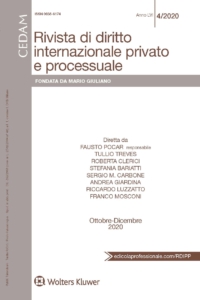Rivista di diritto internazionale privato e processuale (RDIPP) No 4/2020: Abstracts
 The fourth issue of 2020 of the Rivista di diritto internazionale privato e processuale (RDIPP, published by CEDAM) has been released. It features:
The fourth issue of 2020 of the Rivista di diritto internazionale privato e processuale (RDIPP, published by CEDAM) has been released. It features:
Cristina Campiglio, Professor at the University of Pavia, Il matrimonio in età precoce nel diritto internazionale privato (Child Marriage in Private International Law; in Italian)
- In recent years, international instruments to combat early and forced marriages have been flanked by national legislative interventions aimed at denying, or at least limiting, the recognition of marriages concluded abroad by minors. The private international law techniques used in Europe are different but fundamentally referable to special public policy clauses, in some cases inspired by the German doctrine of Inlandsbeziehung. Failure to recognize marital status – with the inevitable repercussions on immigration policies, specifically in the context of family reunification – can harm the fundamental rights of those concerned. Due to its abstract nature, the legislative approach is not able to carry out the evaluation of the minor’s concrete interest that only a case-by-case approach can ensure.
Costanza Honorati, Professor at the University Milan-Bicocca, Il ritorno del minore sottratto e il rischio grave di pregiudizio ai sensi dell’art. 13 par. 1 lett. b della convenzione dell’Aja del 1980 (Return of the Abducted Child and the Article 13(1)(b) ‘Grave Risk of Harm’ Defence in the 1980 Hague Convention; in Italian)
- The “grave risk of physical or psychological harm, or of an intolerable situation” defense pursuant to Article 13(1)(b) of the 1980 Hague Convention constitutes the central hub of the conventional system. In fact, it expresses the difficult balance between, on the one hand, the general imperative to return the abducted child and, on the other, the need to refuse his return in the individual specific case, when this is likely to cause the minor a grave risk of harm. This article examines the application that the exception receives both in the recent Guide to Good Practice prepared by the HCCH Conference and published in March 2020, and in the Italian courts. Through the analysis of many unpublished cases, the peculiarities of the Italian practice on a central provision for effective protection of the abducted child are thus highlighted.
The following comments are also featured:
Loris Marotti, Research Associate at the University of Milan, Aspetti problematici dell’accordo sull’estinzione dei trattati bilaterali di investimento tra Stati membri dell’Unione europea (Problematic Aspects of the Agreement for the Termination of Bilateral Investment Treaties between EU Member States; in Italian).
- On 5 May 2020, 23 Member States signed the Agreement for the termination of Bilateral Investment Treaties between the Member States of the European Union, providing for the termination of all Intra-EU BITs concluded between the parties. The Termination Agreement, which entered into force on 29 August 2020, represents the last step taken by Member States to comply with the European Court of Justice ruling in the Achmea judgment, where the Court found investor-State arbitration based on BITs incompatible with EU treaties. This paper discusses a number of issues arising out of the Termination Agreement. After illustrating its scope and content, the paper focuses on its most controversial aspects, namely the termination of BITs together with the sunset clauses therein contained, and the impact of the Agreement on pending arbitration proceedings. It is argued that while the Agreement seems to be in line with the general international law on treaty termination, its impact on pending proceedings is likely to be problematic according to the general principles regulating the judicial function in international law. Moreover, the paper analyses the controversial implications stemming from the Agreement in terms of the relations between Member States parties to the Agreement and third parties to the ICSID Convention, as well as its impact on investors’ position under international and domestic law.
Marco Pedrazzi, Professor at the University of Milan, Dal disdegno per il diritto internazionale («notwithstanding»…) alla prevalenza del «rule of law»: il controverso percorso che ha portato alla promulgazione della legge del Regno Unito sul mercato interno (From the Contempt for International Law (‘Notwithstanding’…) to the Prevalence of the ‘Rule of Law’: The Controversial Path that Led to the Promulgation of the UK Internal Market Act 2020; in Italian).
In addition to the foregoing, this issue features the following book review by Francesca C. Villata, Professor at the University of Milan: Christopher Kuner, Lee A. Bygrave, Christopher Docksey (eds.), The EU General Data Protection Regulation (GDPR). A Commentary, Oxford University Press, Oxford, 2020, pp. XXXV-1393.


